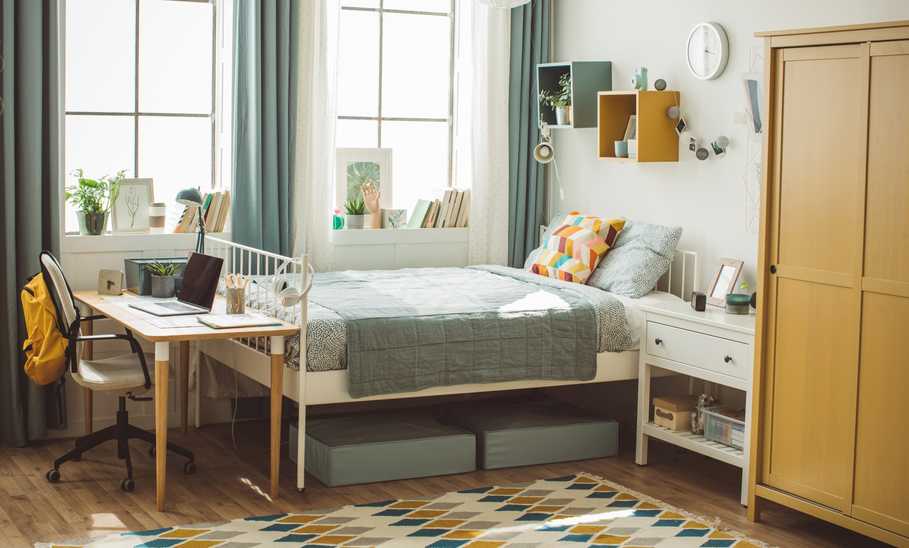Dorm Room Ideas: How to Upgrade Your Dorm Room So It’s Comfortable and Functional

Our evaluations and opinions are not influenced by our advertising relationships, but we may earn a commission from our partners’ links. This content is created by TIME Stamped, under TIME’s direction and produced in accordance with TIME’s editorial guidelines and overseen by TIME’s editorial staff. Learn more about it.
When you go away to university for the first time, you may be anxious about many things, including your living space. For some students, sharing a bedroom is a new experience. For others, living apart from their families for an extended period of time is a challenge. One way to ease the anxiety around starting your collegiate stage of life is to make your dorm room a comfortable (and comforting) space that’s functional despite its small size.
I asked interior designers, professional organizers, residential life advisors, and administrators for advice on how to upgrade your dorm room for comfort and the best way to prepare to live with other students.
“Upgrading a dorm room can make a world of difference,” shared Cortney Novogratz, whose interior design firm and furniture and accessories brand, The Novogratz, offers carefully designed and curated items that work beautifully in a home or a dorm room.
“As a mother, I've seen firsthand how a personalized, comfortable space can ease the transition to college life. A thoughtfully designed room helps students feel more at home and supports their well-being, making their new environment more inviting and manageable,” she says.
Most dorms come sparsely furnished, so consider what you need to improve on to make the most of what’s likely to be a shared and small space. “Invest in beautiful bedding, a durable desk lamp, and versatile storage solutions. These are items that not only serve well in a dorm but can transition into future apartments. From my experience, these practical investments are worth every penny,” recommends Novogratz.
Most dorm rooms are smaller than you might expect (or hope for), and if they are large, chances are, you have a roommate or two. A good way to save space is to ask your school if you can replace a single bed frame with bunks or loft beds. Personally, I would not have wanted a roommate sleeping above or below me, so I would choose a loft bed. Another bonus with a loft is you can designate the space below it for studying.
Before shopping at Ikea or Target for a new bed, check if your school allows swaps. “At most universities, students may not be permitted to remove college-issued furniture from their rooms,” advises Eric Barnes, director of the Office of Residence Life at Connecticut College in New London, CT. “Always check with your school policies directly. Each school may have restrictions about outside furniture (is it fire rated?) for fire safety, for example.”
For example, he says, “Here at [Connecticut College], students can bring additional furniture to personalize their space, but we encourage students to be mindful of the size of their room and, if they are sharing the space, to speak to their roommate first to avoid overcrowding.
If you can’t purchase a storage bed or update a cheap bed frame, use the space underneath your dorm-issued bed. “Use vertical space. Use the space under the bed. I suggest under-the-bed drawers,” said certified and professional organizer Diane N. Quintana, CPO-CD. “These can be used to hold out-of-season clothes, sheets, towels, or even books. A small folding shelf is also good to have. Origami makes one that folds flat and is easy to transport.”


Quintana recommends these three items: “Bed risers are a must. They will lift the bed enough so the space under the bed can be used for storage,” she said. “Two, an over-the-door pocket organizer for the closet door is a life-saver. It can be used for shoes, hats, scarves, bathing suits, toiletries, or anything else that will fit, and three, Command Hooks in a variety of sizes can be used for jewelry, hang tapestries, scarves, backpacks, and more.”

Designer Dan Mazzarini, who won second place in Ikea’s “Design Your Dream Dorm Room” contest when he was in high school, recommends starting with a floorplan of your room to figure out the best way to arrange furniture to maximize square footage.
“If you do this, it will prevent you from needing additional large items. For example, if you can use your desk as a bedside table or put it at the foot of your bed, it serves more than one purpose and doesn’t take up as much space,” he says. “I don’t recommend swapping out the university furniture because it can be a big lift. It’s easier to just add to what comes with the space.”
For some students, a dorm room with a few personal accessories will be fine; for others, creating a color scheme or room theme will be fun. Whatever colors you find soothing and enjoyable are the best picks for making your dorm room feel like your room at home. If your roommate doesn’t want to coordinate a color scheme, don’t let that bother you; just choose the colors that make you feel good.
Lightweight decorative poster frames, pictures of friends and family, and tapestries can all add personality and comfort to your room,” suggests Jodi Peterman, CEO and owner of Elizabeth Erin Designs. “Another great option is tapestries. They come in various sizes, colors, and themes, making them perfect for above your bed or to decorate a large open wall space.” However, she cautions that students “use 3M strips or adhesives that won't damage the walls to avoid fines at the end of the year.”

Don’t forget your floor. “Dorm rooms typically have less-than-ideal vinyl flooring or dingy carpet tiles. Adding an area rug is one of the fastest ways to improve the space. Choose a rug with colors or patterns that reflect your style to add personality to your room,” suggests Peterman.

Liz Toombs, a certified interior decorator and owner and president of PDR Interiors, specializes in decorating sorority homes and says she always recommends rugs. “I always recommend putting a rug down to style the space and make it feel like home. Nylon or wool rugs repel stains, and rugs made with outdoor performance fabrics work well in high-trafficked areas. Polypropylene is inexpensive and can be tossed at the end of the semester. If you have nice rugs, Scotchgard them.”
“A lamp with a dimmer will also make the dorm feel more homey and cozy and avoids any harsh lighting that makes the space feel unfamiliar,” recommends Mazzarini. In addition, small lights you can clip onto a nightstand or bed frame can be useful when you want to read, but your roommate wants to sleep.
Plants can positively affect your mood and well-being and can be used as decor in a dorm room. Depending on the amount of natural light and available space, putting small plants on a windowsill rather than your desk can save space.
If taking care of a plant will be too hard with a busy college schedule, consider succulents that need less attention, or faux plants to brighten and bring color to your dorm room without the pressure of keeping them alive.
“For functionality, I’d suggest a good desk lamp, under-bed storage bins, and a comfortable desk chair,” said Novogratz, who designed a collection of furniture and accessories for dorm room living. “My inspiration came from my kids heading off to college. Seeing how important a comforting space was for them, I wanted to create a collection that blends style, comfort, and functionality. It’s about giving students a space they can truly make their own, even when they’re far from home.”
Consider using an erasable and magnetic whiteboard or calendar for keeping track of your schedule, a small reading light that attaches to your bed, a cushion for your back as university furniture is notoriously uncomfortable, and don’t forget a bin or basket for your school supplies—pens, pencils, calculators, Post-its, and other items. If you need back support when you study, consider purchasing an ergonomic chair.

Getting a good night’s rest is critical for success in college (and beyond), and dorm life isn’t always the best environment for it. Don’t add an uncomfortable bed to the list of reasons you can’t sleep. Consider bringing a mattress topper, soft sheets, a comfortable pillow, and a supply of quilts, blankets, or comforters to keep you cozy and comfortable.
Toombs recommends paying attention to what you put on top of your bed. “The more pillows, the better! They are an inexpensive way to dress up a room and can be tossed at the end of the semester. Pillows are also a good way to show trendy colors or patterns—sequins, feathers, etc.,” she says. Her “bedding tip” for college students: “Quilts, coverlets, and duvet covers are much easier to wash than a bulky comforter.”
Everyone I interviewed remarked on the importance of keeping things organized in a dorm room to reduce clutter and stress. Among the essentials: Quintana recommends a “vertical canvas caddy, which is great to hang in the closet since the closet will probably have only one shelf above the rod. You can find them at many online stores, including Amazon. If you’re looking to save even more space, check out this bedside storage caddy, recommended by Quintana. “It doubles as a bed skirt and has pockets for tissues, glasses, phone, and more.”

In addition to storage ottomans and accent chairs, Toombs and others recommend cube storage organizers. “These can be tucked into a closet for additional clothing and shoe storage or used in the room for any other storage needs, i.e., dry food storage, toiletries, school supplies—the list goes on! The great thing about these is they come in all sizes so you can select what will work best for your space, and they’re an attractive way to maximize storage,” she says.

“For fun, think about adding a colorful rug, cozy throw pillows, and string lights,” shared Novogratz. “These small touches can transform a dorm room into a warm and inviting space.” Ideally, your dorm room should be used to socialize and study, and your environment should function well for both.
“There are many products to get that will make the dorm experience better. Most of them are not expensive,” adds Quintana. “A reading backrest pillow with arms is wonderful to support the student's back while sitting on the bed doing homework.”
If you have room, bean bag chairs and oversized cushions can work well in dorms as extra seating and buying curtains can add a pop of color and home-like feel.
When a room is small, vertical space can help you store your belongings without reducing your footprint. Try small bracket shelves hanging organizers, like an over-the-door shoe rack, which can hold personal items other than shoes and hooks.
“Anything can go under the bed, such as plastic totes. Sometimes you raise the bed up in a dorm or sorority house rooms, and there are bed skirts that are made for beds on risers,” says Toombs. Slim moveable drawers that fit under the bed (some have wheels) may work for storing flat items like sheets, towels, or winter clothing.
If you can add a piece or two of furniture that can be used in multiple ways, like a storage ottoman, a desk with a set of drawers on one side, or a futon that flips into a couch when you’re not sleeping, you can maximize your space.
“Storage items are by far the most important items you can add to the space,” says Toombs. “Ottomans that include storage are wonderful additions to a dorm room. They can act as extra seating and storage and can be tucked away easily when needed! If the dorm has the space — bringing a small-scale accent chair is a good idea as well.”
When you live with someone, especially for the first time, creating an open and honest communication line and respecting boundaries (even in a small room) are the building blocks for a successful dorm living experience.
“While it may be scary, remember that there are others in a similar situation who may
be just as anxious,” says Barnes. “Be flexible, be open to hearing concerns from your roommates, and offer your thoughts when asked. Be honest. Managing expectations can be important as you prepare to arrive on campus.”
“Nearly all colleges and universities facilitate roommate agreements with new students,” shares Leanna Fenneberg, PhD, senior vice president for student life at Duquesne University in Pittsburgh, PA. “At our university, resident assistants facilitate roommate agreements and suitemate agreements for all residential students at the start of the year.” She continues, “While these conversations can feel awkward for first-year students, we encourage students to take this opportunity seriously as a time to communicate expectations, preferences, and boundaries and navigate any potential differences.”
Dr. Fenneberg recommends openly discussing interests and expectations related to cleanliness, sleep, noise, shared space and belongings, and guests. “Being upfront is a great way to break the ice with a new roommate and is important as a tool to revisit if the behaviors of one roommate later do not align with what was agreed upon.”
She explains that roommate agreements communicate what’s important to each individual so the person sharing their space knows how to demonstrate respect for that person and their belongings. They also offer a jumping-off point to revisit in discussion as the year progresses and students experience the joys, and sometimes frustrations, of living together.
If things go sideways, don’t fret, says Dr. Fenneberg. “Resident assistants continue to be a resource throughout the year to help students navigate any potential conflicts or challenges in their living spaces.”
“It's helpful to enter relationships from a place of positive intent — anticipating that a roommate means well. Roommate frustrations often stem from a lack of clear communication, as we all have unique expectations for our space and other people,” explains Dr. Fenneberg.
“Students should communicate clearly with their roommates regarding any personal items that are off limits. The structure of a facilitated roommate agreement is a great opportunity to do this. If roommates respect these personal or private belongings, it can be helpful to not sweat the small stuff if there is more fluidity in other items,” she says. “In my experience, students generally respect the individual designated areas of a room (e.g., personal desk, closet, dresser, bed) and keep things private in those spaces.”
Barnes recommends: “Discuss in advance so everyone can plan accordingly. Once living together, be honest about what items can be borrowed or shared and what cannot. For example, ‘Yes, you can use the television (under these circumstances), but no, you cannot borrow my clothes.'”
If you and your roommate can find common ground, there may be opportunities to collaborate on your shared space, which, as Barnes points out, may be limited. This can be a good reason to coordinate what items you and your roommate or roommates want to share.
Quintana adds that connecting with your roommate is important to plan for items like a small refrigerator, mini microwave, an electric kettle, coffee maker, or a cold brew station that can be shared. If these amenities are something you would like in your dorm room, consider talking to your roommate about sharing expenses for coffee, snacks, and tea to keep your room stocked.
In addition, she says, some students like to talk about color-coordinating bedding and art, but others aren’t too concerned. Joint decorating schemes are up to the individuals living together.
The information presented here is created by TIME Stamped and overseen by TIME editorial staff. To learn more, see our About Us page.



